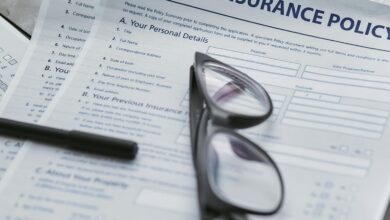The Impact of Your Credit Score on Insurance Rates: A Comprehensive Guide

In today’s financial landscape, your credit score plays a pivotal role in determining not only your ability to secure loans and credit cards but also how much you pay for various services. One area where your credit score has a significant impact is insurance rates. Whether you’re purchasing auto insurance, homeowners insurance, or even renters insurance, your credit score can influence the premiums you pay. This article delves into the intricate relationship between credit scores and insurance rates, exploring why insurers use credit scores, how they affect your premiums, and what steps you can take to improve your financial standing.
Understanding Credit Scores
Before we dive into the connection between credit scores and insurance rates, it’s essential to understand what a credit score is and how it’s calculated.
What Is a Credit Score?
A credit score is a numerical representation of your creditworthiness, ranging from 300 to 850. It is based on your credit history, which includes factors such as payment history, credit utilization, length of credit history, types of credit accounts, and recent credit inquiries. The most commonly used credit scoring model is the FICO score, developed by the Fair Isaac Corporation.
- Excellent Credit: 800–850
- Very Good Credit: 740–799
- Good Credit: 670–739
- Fair Credit: 580–669
- Poor Credit: Below 580
Lenders and financial institutions use credit scores to assess the risk of lending money to an individual. A higher score indicates lower risk, while a lower score suggests higher risk.
Why Do Insurers Use Credit Scores?
Insurance companies are in the business of managing risk. To determine how much to charge for premiums, they evaluate the likelihood that a policyholder will file a claim. Surprisingly, studies have shown a correlation between credit scores and the frequency or severity of claims filed. While this relationship may seem counterintuitive at first glance, insurers argue that individuals with higher credit scores tend to be more financially responsible and less likely to file claims.
The Role of Credit-Based Insurance Scores
Insurers don’t use traditional credit scores directly; instead, they rely on a specialized metric called a “credit-based insurance score.” This score focuses on aspects of your credit history that are predictive of future claims. Factors such as late payments, outstanding debt, and credit utilization ratios are weighted differently compared to traditional credit scoring models.
How Does Your Credit Score Affect Insurance Rates?
Your credit score can significantly impact the cost of your insurance premiums. Here’s how:
1. Higher Credit Scores Lead to Lower Premiums
Individuals with excellent or very good credit scores typically enjoy lower insurance rates. Insurers view them as low-risk customers who are less likely to file frequent or costly claims. For example, someone with a credit score of 800 might pay hundreds of dollars less annually for auto insurance than someone with a score of 580.
2. Lower Credit Scores Result in Higher Premiums
Conversely, individuals with poor or fair credit scores often face higher insurance premiums. Insurers perceive these individuals as higher-risk clients, leading to increased costs. In some cases, people with low credit scores may even struggle to qualify for certain insurance policies altogether.
3. State Regulations Vary
It’s important to note that not all states allow insurers to use credit scores when setting rates. For instance, California, Massachusetts, and Hawaii prohibit the practice for auto insurance. However, in states where it is permitted, credit scores remain a key factor in determining premiums.
Real-World Examples
To illustrate the impact of credit scores on insurance rates, let’s consider two hypothetical scenarios:
Scenario 1: Excellent Credit Score (800)
John has an excellent credit score of 800. When shopping for auto insurance, he receives quotes averaging $800 per year. His insurer views him as a responsible driver and offers competitive rates.
Scenario 2: Poor Credit Score (550)
Sarah has a poor credit score of 550 due to missed payments and high credit card balances. Despite having a clean driving record, her auto insurance quotes average $1,500 per year—nearly double what John pays. Her insurer considers her a higher-risk customer based on her credit profile.
This stark difference highlights the importance of maintaining a strong credit score to save money on insurance.
Steps to Improve Your Credit Score and Lower Insurance Rates
If your credit score is dragging down your insurance premiums, there are actionable steps you can take to improve it over time. Here are some strategies:
1. Pay Bills on Time
Late payments can severely damage your credit score. Set up automatic payments or reminders to ensure you never miss a due date.
2. Reduce Credit Card Balances
High credit utilization (the ratio of your credit card balance to your credit limit) negatively impacts your score. Aim to keep your utilization below 30%, ideally closer to 10%.
3. Avoid Opening Too Many New Accounts
Each time you apply for new credit, a hard inquiry is recorded on your credit report, which can temporarily lower your score. Limit applications unless absolutely necessary.
4. Dispute Errors on Your Credit Report
Mistakes on your credit report can unfairly lower your score. Regularly review your reports from the three major bureaus (Equifax, Experian, and TransUnion) and dispute any inaccuracies.
5. Build a Long Credit History
The length of your credit history contributes to your score. Keep older accounts open and active, even if you don’t use them frequently.
Other Factors That Influence Insurance Rates
While your credit score is a critical factor, it’s not the only one insurers consider. Other elements include:
- Driving Record: Accidents and traffic violations increase auto insurance premiums.
- Location: Living in an area prone to natural disasters or theft can raise homeowners or renters insurance costs.
- Type of Vehicle: Expensive cars or those with high repair costs lead to higher auto insurance rates.
- Coverage Options: Opting for comprehensive coverage or low deductibles increases premiums.


